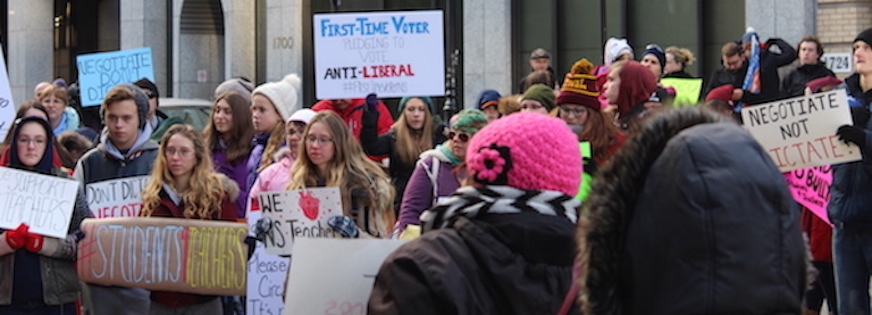
Student protest, December 5, 2016.
(This column originally appeared in the Halifax Examiner
on Monday, January 30, 2017.)
It’s Monday. So it must be time for the latest zig in the zig-zaggy, twisty-turny, tortured tale of Stephen McNeil and the Nova Scotia Teachers Union.
On Friday afternoon, the union announced its 9,300 members would resume their work-to-rule job action today because — in the words of union president Liette Doucet — “we don’t know if we have a contract.”
The Friday afternoon before that, the union had announced it was suspending the work-to-rule campaign it began back on Dec. 5 because it believed it did have a contract — the province and the union had finally reached a(nother) tentative agreement.
What happened? How we got from the “there” of no-work-to-rule to the “here” of back-to-non-business-as-unusual is a tale that may — or may not be — worthy of Machiavelli.
But let us begin with the context, the interminable prologue to this seemingly never-ending drama.

Premier Stephen McNeil. Photo: Halifax Examiner
Stephen McNeil’s Liberals arrived in office in 2013 determined to slay the public sector union dragon. After they tried — and failed — to decimate the ranks of the Nova Scotia Government Employees Union by moving some of their members to other unions, they trained their bullseye on what they assumed was the weak link in the solidarity chain: the Nova Scotia Teachers Union.
Teachers were milquetoast, not militant. They’d had the right to strike since 1974, but had never once exercised it. Strike a good-for -the-government deal with a major union like the teachers — or so the reasoning went — and the other, more militant public sector unions would have no choice but to fall in line.
At first, it seemed the Liberal strategy was working. In mid-November 2015, with the long, dark shadow of a draconian government-legislated settlement hanging over their discussions, the teachers union and the province agreed to a tentative contract after only a month-and-a-half of back-and-forth negotiations. Its provisions neatly mirrored the government’s tough talk almost clause-for-clause.
The NSGEU — seeing the chalk on the blackboard — reluctantly agreed to recommend a similar contract to its members.
Break out the champagne. Prepare the writ. Stephen McNeil’s Liberal government was on its way to a second majority government.
Except —
On Dec. 1, 2015, 94 per cent of the province’s teachers voted 61 per cent to reject the tentative deal. Teachers, it turned out, were madder than hell — at the McNeil government for its bully-boy tactics, at their own union negotiators for going along with the deal — and they weren’t going to take it anymore.
And that was the beginning of what has been an unpredictable year-long roller-coaster ride.
A new union executive struck yet another tentative deal in October. This time 96 per cent of teachers turned out to vote 70 per cent to reject it, and then gave their union an overwhelming 96 per cent strike mandate.

Education Minister Karen Casey. Photo: Ryan Taplin / Local Xpress
In early December, the union upped the ante, announcing plans to begin to work to rule. Before that could happen, Education minister Karen Casey countered by declaring she was locking out the students for their own “safety,” and the government recalled the legislature to impose its previously rejected contract on the teachers.
On that particularly chaotic Monday, the Liberal caucus — facing public and parent fury for its government’s blundering stupidity — revolted. Casey flip-flopped, and the government sent the MLAs home without even introducing its announced legislation. And the teachers continued to work to rule.
Just another Monday in Chaos.
Which eventually led to conciliation, then more negotiations, then yet another tentative contract, suspension of the union’s work to rule campaign and a “pleased-to-have-reached-this-point” news release from Karen Casey.
Except —
Well, for starters, the no-longer-milquetoast teachers still don’t appear to like much about what their union leaders have described as “the best deal that was available.”
The agreement reduces a planned wage freeze from 24 months to 20 months, gives the teachers two extra days of paid leave per year and sets up a union-department committee to address “challenges” teachers face on the job. For many, that didn’t seem like “the best deal” after a year and a half.
What would happen if the teachers rejected a third tentative contract when they vote Feb. 8? What would that say about the union executive’s ability to represent their members?
Perhaps fortuitously, perhaps not, enter Stephen Bull-in-a-China-Shop McNeil. McNeil decided to publicly dispute the union’s interpretation of “two days of paid leave.” The union had told its members that since the government refused to budge on its decision to end long-service awards, “we are taking back one per cent of our service over course of agreement… Teachers will now receive two paid days off to be used during the school year.”
“Those were not days off,” McNeil — who wasn’t in on the negotiations — told reporters. “They were actually for marking.”
Which gave union president Liette Doucet the opportunity to argue McNeil had “reneged on the agreement,” which gave Doucet reason enough to resume work to rule, and may ultimately give the union executive cover if the teachers reject this deal too.
As for McNeil, it’s entirely possible he blundered into this without considering the consequences — or it’s equally possible he wants the teachers to reject the agreement so he can impose a worse deal on them. If they reject a third tentative agreement, it strengthens the government’s eventual courtroom argument it had done its best to negotiate and had no choice but to impose a contract. Machiavellian?
What’s next?
Who knows? Next Monday is just another chaotic week away!








 STEPHEN KIMBER, a Professor of Journalism at the University of King's College in Halifax and co-founder of its MFA in Creative Nonfiction Program, is an award-winning writer, editor and broadcaster. He is the author of two novels and eight non-fiction books. Buy his books
STEPHEN KIMBER, a Professor of Journalism at the University of King's College in Halifax and co-founder of its MFA in Creative Nonfiction Program, is an award-winning writer, editor and broadcaster. He is the author of two novels and eight non-fiction books. Buy his books
Interesting that judges have had a government deal imposed on them with no outcry.
Hardly the same type of issues.